
After studying journalism in Prague with TFAS, Jovan Tripkovic ’19 has traveled the world interviewing Orthodox church leaders and covering unique stories of religion and politics.
Jovan participated in the 2019 European Journalism Institute (EJI). EJI is a week-long journalism training program held in Prague that brings together approximately 25 early to mid-career journalists and upper-level journalism students from around the world. The program is co-hosted by The Fund for American Studies (TFAS) and The Media Project (TMP), with academic credit available through Anglo-American University.
EJI participants, like Jovan, interact with industry professionals through lectures and workshops to broaden their understanding of religion in public life, explore fundamental issues related to journalism ethics, and improve reporting skills.
From Prague to Alaska to Israel, Jovan tells us about his adventures since TFAS in the Q&A below.
Tell us about your experience at EJI. What value did you gain from the program?
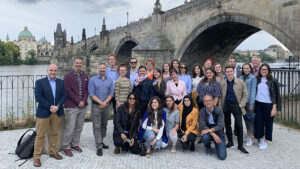
I’d known about TFAS’s academic program in Prague for years. In late 2018, I found out that TFAS will restart the EJI program. Since I was already interested in journalism and I covered United States politics for several media in Serbia, I decided to apply to the program and attend in the summer of 2019.
The academic curriculum at EJI was impressive. Spending a week with amazing faculty and like-minded peers was intellectually fulfilling. I loved learning about business/entrepreneurial journalism, reporting on the Abrahamic Faiths and photojournalism. As a special added value to the program were practical homework assignments that included different tasks such as: how to write a successful pitch and photo portraits. I also appreciated learning from Sky News correspondent David Blevins about his interviewing skills, which I later applied in my own work.
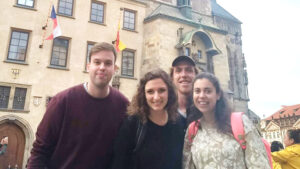
On top of valuable practical skills, EJI gave me a network of young journalists from the United States, Europe, and the Middle East. Now I have friends from Colorado, Hungary, Chile and many other places. These friendships also have a professional component: my friend and roommate during EJI, Benjamin Mandile is a staff writer for the Trinidad Chronicle-News in Colorado, Catalina Ramos is a news anchor in Chile and Daniella Horvath is a social media editor for Radio Free Europe’s Hungarian Service.
The European Journalism Institute enriched my life both personally and professionally!
What faculty member made a lasting impression on you?
I really enjoyed sessions with Dr. Ibrahim Al-Marashi. His family’s history is fascinating (future participants should take notes on it). I’ve learned a lot from him about reporting on the Abrahamic Faiths as well as the role of the Clash of Civilizations theory in journalism.
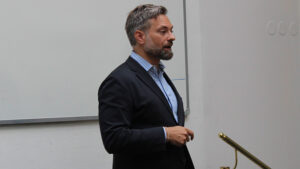
Professor Paul Glader made a lasting impression on me for several reasons. Before EJI, I didn’t know much about entrepreneurial and business journalism, which was covered in Professor Glader’s sessions. In addition to interesting lectures, Professor Glader was very communicative with participants during breaks.
However, our story begins after I completed the program. Professor Glader has had a profound impact on my career growth. He gave me a chance to write about Orthodox Church affairs for ReligionUnplugged.com, an online publication that he leads. Not many editors are willing to give a chance to a young and aspiring journalist.
I had an opportunity to publish numerous stories and interviews for ReligionUnplugged.com. I interviewed Rod Dreher, one of the most influential conservative writers today, and Father John Chryssavgis, an environmental advisor to the Ecumenical Patriarch Bartholomew. I also interviewed a football coach, Joseph Kennedy, a few days before the Supreme Court Ruling in his case about silent prayer on the football field.

Thanks to Professor Glader and the relationship we built during EJI, I traveled to Alaska in November of 2021 to cover stories on Orthodox Christian communities in the northernmost state. That journey turned into a project: Orthodox Alaska, for which I wrote articles about a former hippie, who is now an Orthodox Christian convert and bee keeper. I also wrote about an Orthodox Christian seminary on Kodiak Island and an Alaskan family that decided to move to Fiji in order to pursue missionary work.
At the end of the last year, I had an opportunity to travel to Israel with the Evangelical Press Association. The trip was funded by the Israel Ministry of Tourism and it was an unforgettable experience.

While working on these stories, I learned a lot from Professor Glader during our editing sessions, which helped me a lot to improve my writing and learn how to produce narrative journalism articles.
The European Journalism Institute was my gateway to religion journalism!
What have you been up to since completing the program?
I had to leave the program a day early, to fly to Auburn, Alabama, to attend Mises University, organized by the Mises Institute. A few months later, I found myself in Berlin, Germany, interning for a non-profit organization. I was also an intern at the James Wilson Institute, based in Washington, D.C.
Eventually, I went on to finish a master’s in European and Global studies at the University of Padova in Italy. In the meantime, I enrolled in another master’s program in Political Science at the University of Wyoming. Thanks to the generosity of the School of Politics, Public Affairs & International Studies, I was offered a full-ride scholarship and a teaching assistant position.
Besides being a professional student, for a few years after I attended EJI, I was a First Liberty fellow in Washington, D.C., a Wilbur fellow at the Russell Kirk Center in Mecosta, Michigan, and a Shaftesbury fellow at the Center for Religion, Culture, and Democracy in Dallas, Texas.
I also attended countless programs organized by the Acton Institute, the Tikvah Fund, Alliance Defending Freedom, Religious Freedom Institute, Leadership Institute, Young America’s Foundation and Heritage Foundation, among others.
Why are programs like EJI beneficial to the modern landscape of news reporting and international relations?
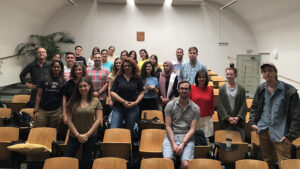
In this era of media distrust, the European Journalism Institute’s mission to train and educate young journalists is timely, virtuous and necessary.
EJI is beneficial because it provides practical skills for young, aspiring journalists that help them excel in their careers. Also, EJI covers different types of journalism such as religion, business and photo journalism among other things. In my opinion, religion journalism is often neglected and underrepresented in mainstream media. The European Journalism Institute also covers journalism ethics, an area that is pushed aside in the era of fake news and tabloid media.
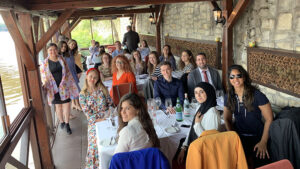
In addition to journalism training, EJI participants learn about international affairs. My cohort had an opportunity to learn about life in Czechoslovakia under Communist rule or Russia’s activities to undermine European democracies. It is of crucial importance for journalists to develop a deep understanding of current affairs and how international trends are related to the stories they are covering. The EJI curriculum covers exactly these areas!
Not to forget, EJI participants now receive two U.S. credit hours from Anglo-American University upon successful completion of the program. This wasn’t the case in 2019 when I attended EJI, which makes me want to apply and attend the program again!
This isn’t the first time we’ve heard TFAS alumni say they want to attend the programs again to relive the TFAS experience. Even though Jovan can’t attend EJI again in 2023, you still can! TFAS International is accepting applicants until Wednesday, February 15. Learn more about the program here and apply today!
TFAS alumni, professors, faculty and friends are encouraged to nominate young leaders for the program at TFASinternational.org/nominate.

